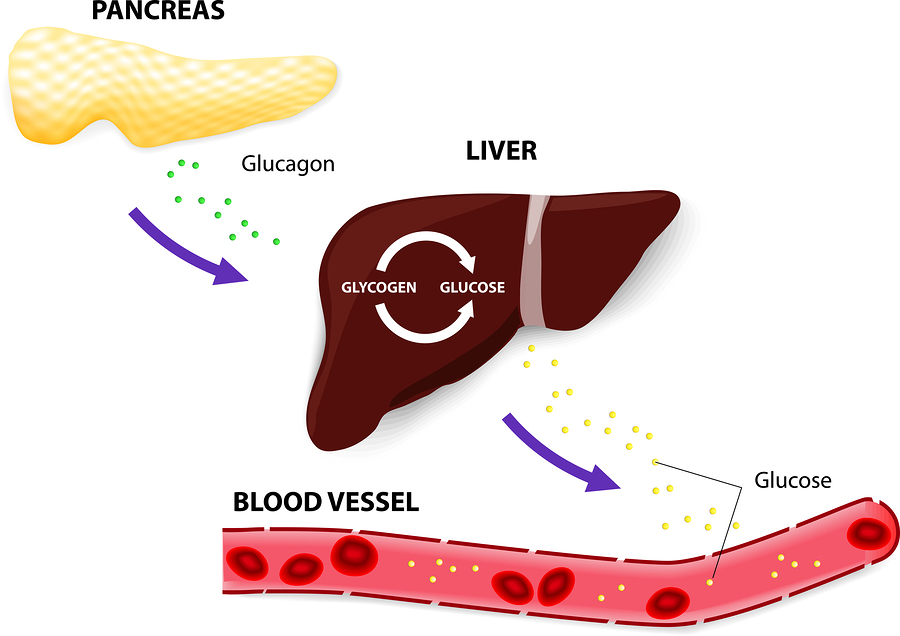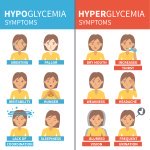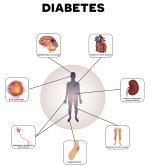Causes of Low Blood Sugar

Wondering about the causes of low blood sugar? Low blood sugar, also known as hypoglycemia, can be a very dangerous condition. Low blood sugar can happen in people with diabetes who take medications that increase insulin levels in the body. Taking too much medication, eating less than normal, skipping meals, or exercising more than usual can sometimes lead to low blood sugar for these individuals.
Blood sugar is also known as glucose. Glucose or blood sugar generally comes from food and serves as an important energy source for the body. Carbohydrates — foods such as potatoes, rice, bread, tortillas, cereal, vegetables, fruits and milk — are the body’s main sources of glucose.
After you eat, glucose or blood sugar is absorbed into your bloodstream, where it travels to your body’s cells. A hormone called insulin, which is made in the pancreas, helps your cells utilize glucose to generate energy. If you consume more glucose than your body needs, your body will store some of it in your liver and muscles. The rest of it your body will convert into fat so it can be used for energy when it’s needed later.
Without enough glucose or blood sugar, your body cannot perform its normal functions. In the short term, people who aren’t on medications or conditions that increase insulin have enough glucose to maintain blood sugar levels, and the liver can make glucose if needed. However, for those on these specific medications or suffering from this condition, a short-term reduction in blood sugar can cause a lot of health problems. The blood sugar is considered low when it drops below 70 mg/dL.
Immediate treatment for low blood sugar levels is important to prevent more serious complications from developing.
What causes low blood sugar?
Low blood glucose can occur for a number of reasons.
Diabetes and low blood sugar
Diabetes Mellitus affects your body’s ability to use insulin. Consider insulin as the key that unlocks your cells, letting glucose in for energy. People with diabetes use a variety of treatments to help their bodies utilize the glucose in their blood stream. Among these are oral medications that increase insulin production and insulin injections.
If you consume too much of these types of medications, your blood sugar levels may drop too low. People also sometimes experience low blood sugar when planning to eat a big meal, but then they do not eat enough. Skipping meals, eating less than normal or eating later than normal but taking your medication at your normal time can also lead to low blood glucose levels.
Unplanned excess physical activity without eating enough can also cause a significant drop in blood glucose levels.
Drinking alcohol when you are on these medications can also lead to low blood glucose, most especially if it replaces food. When the body is trying to get rid of alcohol it becomes worse at managing blood glucose levels.
Other causes of low blood sugar
You don’t have to have diabetes mellitus to experience low blood sugar. Some other causes of low blood sugar can include:
• Certain medications, such as quinine
• A tumor that produces excess insulin
• Endocrine disorders, such as adrenal gland deficiency
• Some medical conditions, such as hepatitis or kidney disorders
Symptoms of Low Blood Sugar
The symptoms of low blood sugar levels are very similar to full-on Diabetes itself, and these include; dizziness, most especially before meals; uncharacteristic irritability or short temper, blurry vision, slurred speech, huge hunger pangs, and may even lead in extreme conditions to a Coma. Strangely enough, nightmares and calling out in one's sleep are sometimes signs of low blood sugar, usually brought on by overheating in bed.
Pale and sweaty skin - when the body begins to experience low blood sugar it releases epinephrine, also known as adrenaline. This is an attempt by the adrenal glands to raise the body's blood glucose levels. High levels of the epinephrine hormone cause the skin to become very pale.
Headaches - The brain, as do all of the major organs, needs sugar. A drop in blood sugar levels means that there is less glucose available to the brain. If there is only a slight drop in the glucose levels, the result may be a mild headache or double vision. A more severe drop, however, can lead to seizures. And an even greater drop can definitely lead to loss of consciousness, difficulty concentrating and confused speech or, in some cases, lapsing into a coma.
Extreme hunger - the body system is always in a constant state of adjusting itself to various circumstances. When the blood glucose levels drop, the body instinctively understand that it needs food to get the levels up again. The way of letting us know that is to send hunger signals from the brain to the body in an attempt to get us to eat. Once we eat, the blood sugar levels return to normal and the hunger subsides.
Racing heart beat - adrenaline also causes the blood vessels to constrict and the heart to beat much faster than. The person may experience heart palpitations and a pounding heartbeat. Other symptoms caused by adrenaline flooding through the body can be trembling of the limbs, a tingling sensation in the hands, and a general sense of anxiety and stress.
The above signs usually do not start to show until the blood sugar levels fall a fairly significant amount such as below 55 milligrams per deciliter of blood. Also, if the person is taking medications for symptoms other than diabetes, it's very important to know that some medications may mask some of these symptoms. In addition, not everyone has the same reactions to low blood glucose so they may naturally experience different symptoms.
It is not unusual for someone diagnosed with diabetes to occasionally suffer from low blood sugar. In fact, diabetics may become very familiar with many of these symptoms as regulating the blood sugar levels with medicines, although pretty accurate, is not an exact science. And as the blood glucose levels return to normal, the symptoms will normally dissipate. Nevertheless, anyone experiencing any of the above conditions should ensure that their physician is aware of them.



New! Facebook Comments
What do you think? Share your thoughts below...